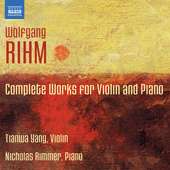|
Back
01/17/2013
Wolfgang Rihm: Phantom und Eskapade – Hekton – Antlitz – Eine Violinsonate – Uber die Linie VII
Tianwa Yang (violin), Nicholas Rimmer (piano)
Recorded at the Stadthalle Ettlingen, Germany (April 1-4, 2012) – 75'05
Naxos 8.572730 – Booklet in English and German

With the death of Hans Werner Henze last October, the mantel of senior figure of German music passed to Wolfgang Rihm. Rihm's prodigious start and prolific output make it seem like he's been around much longer than a mere 60 years. His compositional career began in the 1960s, when the Darmstadt School was losing its dominance and new movements like minimalism and postmodernism were beginning to take hold. Rihm's music is adventurous, but there is always lingering attachment to the Austro-German tradition, sometimes veiled behind extreme gestures and sometimes presented in allusions or outright quotations. The present disc is a fascinating survey of the composer's works featuring violin alone and in duo with piano, and the works span no less than 25 years of the composer's career.
The two works from the 1970s on the disc, Hekton and Eine Violinsonate make for satisfying listening. Aphoristic, they present fascinating gestures in counterpoint between the two players. The two-fold structure of Hekton provides a satisfying frame to hang onto, while in the sonata, the obsessive pitch centricity again provides a welcome point of reference. Hekton also has the most interesting ending and is the only work on the disc that doesn't end with a protracted fadeout. Eine Violinsonate has an arresting, invigorating middle section that represents the most lively music on the disc.
The three later works, however, ramble and, when Phantom undo Eskapade and Uber die Linie VII reach their fifteenth minute or so, one seems hard-pressed to remember where the music came from, let alone committed to where it's eventually going. Indeed, despite the amount of time separating the works on the program, there is not much differentiation of style. One misses any sense of compositional growth from Rihm, certainly not when compared to works composed decades apart by, for instance, Beethoven, Stravinsky or Ligeti. Indeed, the gestures from each of these are essentially fungible. One could excise that energetic middle section of Eine Violinsonate and append it to Antlitz without a jarring style break. Try doing that with Mahler's first and ninth symphonies!
Tianwa Yang is clearly an extremely talented and devoted violinist, and gives each work on the program her all. She has a lovely tone, plays technical passages with bravura, and floats the many (many!) high sustained notes with perfect intonation. In the works with piano, Nicholas Rimmer produces a wonderful range of colors and contorts, contracts and bangs appropriately. So, for listeners looking for a documentation of an important living composer's works for solo and accompanied violin, this disc will be of good service.
It must be noted that the antiseptic booklet essay is of no help at all. What is missing is any explanation (aside from a brief sentence in Yang's biography) of why this duo was compelled to record a disc full of Rihm's music. None of the works was written specifically for either one of them. While the included interview with the composer is welcome, the performers must know how to make the music communicate, and words from them might have lent more perspective into sustaining attention through the lengthier works.
Marcus Karl Maroney
|